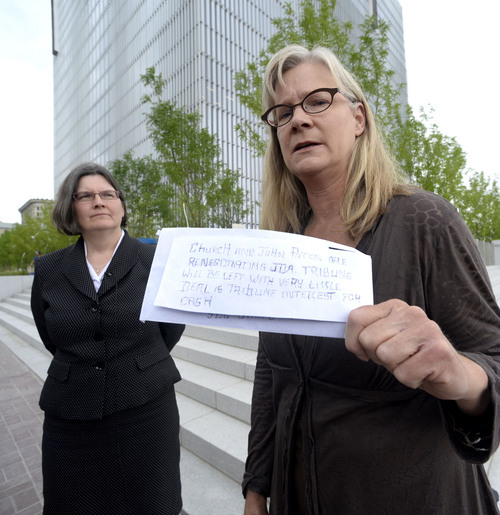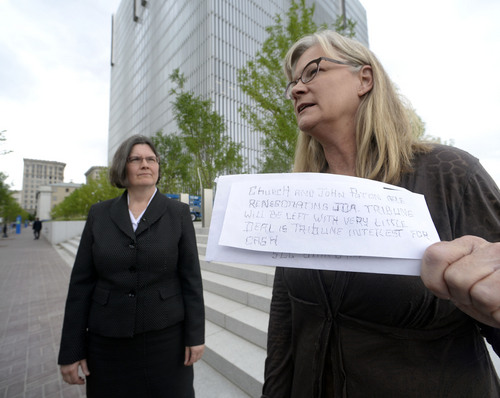This is an archived article that was published on sltrib.com in 2014, and information in the article may be outdated. It is provided only for personal research purposes and may not be reprinted.
Owners of The Salt Lake Tribune may not intend to shut it down, but their newly revised business plan still risks putting the newspaper in a downward spiral, according to a group of former Tribune employees and readers in the community.
The nonprofit group, Citizens for Two Voices, filed its latest claims late Thursday in a federal lawsuit seeking to reverse the new partnership between The Tribune and its rival Salt Lake City daily, the LDS Church-owned Deseret News.
While The Tribune's corporate owners have stated they have no plans for its closure, the new operating agreement's cuts to Tribune profits and other changes are akin, Citizens for Two Voices argues, to a patient contracting a terminal disease.
"The amount of time it might take for the illness to exact its toll might vary, but the conclusion itself is foregone," the group says in its new filings. "Contracting the terminal disease (i.e., entering the downward spiral) is as much irreparable harm as the ultimate closure."
A judge has set a hearing in the case for Monday.
Citizens for Two Voices, also known as the Utah Newspaper Project, is asking that amendments to the newspapers' joint-operating agreement (JOA) be halted, including changes that gave the News control over the two dailies' joint operations and reduced by half The Tribune's share of profits, generated jointly from print advertising and circulation.
Two separate investigations are underway into the JOA changes made last fall, one by the U.S. Justice Department and the other by the Utah attorney general's office.
In their own filings earlier this month, top executives at the News and New York-based Digital First Media, which runs The Tribune on behalf of New York hedge fund Alden Global Capital, contend the new JOA has strengthened the newspaper and its evolution toward digital publishing. Undoing the pact, they maintain, would damage The Tribune's newly crafted business strategy.
But in its filings Thursday, Citizens countered that prior revisions to the newspaper business pact in 2011 already had given The Tribune full control of its digital operations, casting doubt on claims the daily might lose that control if the current plan was halted.
In an affidavit filed July 10, Digital First CEO John Paton says allegations that the new deal has put The Tribune in financial trouble are unfounded, but, Citizens notes in its filings, he has not provided balance sheet information to back that up.
While touting his digital strategies, the group says, "Mr. Paton never says, either generally or with specific dollar figures, how The Tribune is doing under the October 2013 JOA, especially compared to how it was doing before."
The group also argues that by giving the News veto power over who owns The Tribune, the JOA violates antitrust protections under the Newspaper Preservation Act, the federal law that allows the two competing dailies to cooperate on business operations.
"The knowledge that Deseret has an unconditional veto over the identity of potential purchasers," the new filings say, "is a chilling factor to prospective purchasers."
Twitter: @Tony_Semerad





